A Water Skier on Florida Waters: Legal Skiing Situations Explained
Water skiing is a thrilling activity that many individuals enjoy in the Sunshine State of Florida. It's essential to have a clear understanding of the legal and safety regulations that apply to this exhilarating sport. In Florida, water skiing is only permitted during daylight hours, specifically from one-half hour before sunrise to one-half hour after sunset source. Engaging in water skiing outside of these hours is considered illegal and may result in hefty fines.
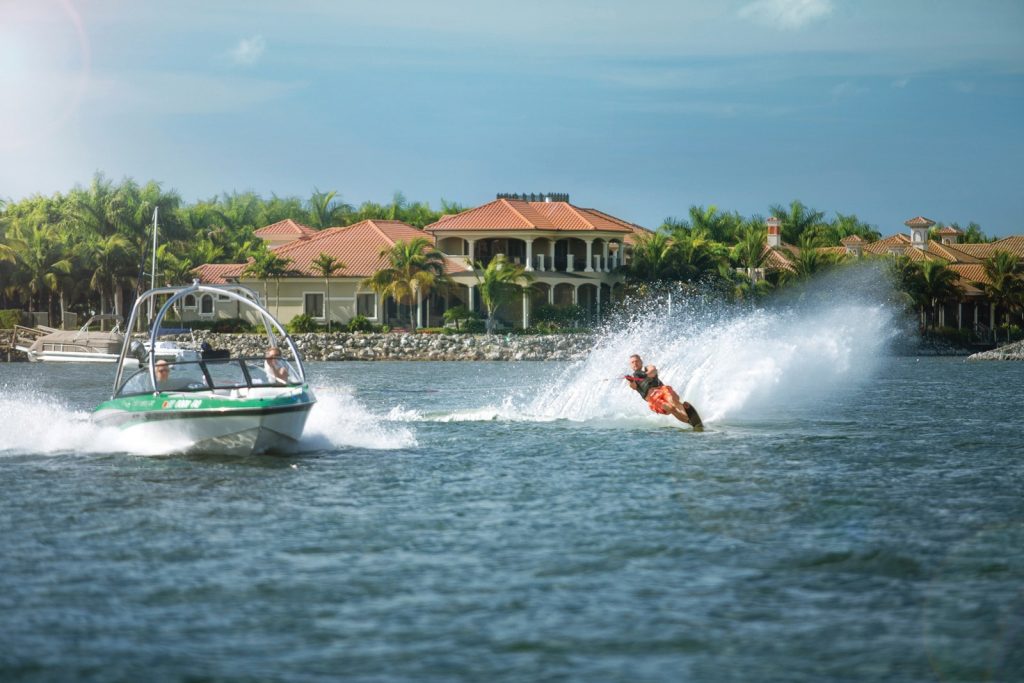
In addition to being mindful of the allowed hours, skiers should also consider other important factors when venturing out into Florida waters. This includes using the appropriate water skiing equipment and adhering to other safety regulations, such as having an observer on board or using a wide-angle rearview mirror source. Skiers must also be cautious of other vessels, fixed objects, and abide by any specific rules at designated courses, locations, or tournaments.
Key Takeaways
- Legal water skiing hours in Florida are from one-half hour before sunrise to one-half hour after sunset.
- Safety regulations require appropriate equipment and the presence of an observer or wide-angle rearview mirror.
- Skiers should be cautious and respectful of other vessels and abide by specific rules at designated locations.
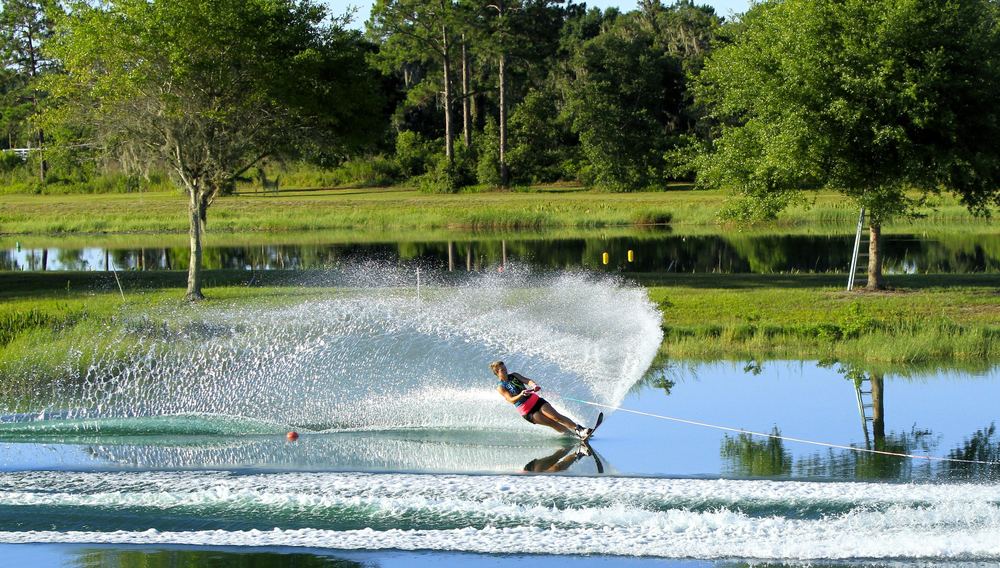
Understanding Water Skiing in Florida
Florida is a popular destination for water sports enthusiasts, and water skiing is one of the most enjoyed activities in the state. However, there are specific regulations that water skiers in Florida need to adhere to in order to ensure safety and compliance with the law.
Water skiing in Florida is only permitted during daylight hours, which means skiers can legally engage in the sport from half an hour before sunrise to half an hour after sunset 1. This guideline prioritizes safety, as visibility is an essential factor when participating in water sports.
It's essential for water skiers in Florida to be aware of the requirements for both the skier and the boat operator. According to Florida law, a person operating a vessel that is towing a water skier must have an observer onboard or be equipped with a wide-angle rearview mirror 2. This ensures that the operator can monitor the progress of the person being towed and quickly respond to any issues that may arise.
In addition to the time restrictions and the observer requirement, water skiers in Florida must also adhere to specific safety gear requirements3. This includes wearing a life jacket while skiing for the protection of the skier in case of an accident in the water.
It's essential for water sports enthusiasts and water skiers in Florida to comply with these regulations in order to enjoy the beautiful Florida waters safely. Being knowledgeable about the rules can help ensure a fun and safe water skiing experience for all involved.

Legal and Safety Regulations
In Florida, legal and safety regulations surrounding water skiing have been put in place to ensure people can enjoy this recreational activity safely. According to Florida law, water skiing is only permitted during daylight hours, from one-half hour before sunrise to one-half hour after sunset. This is primarily for safety reasons, as visibility is crucial for both the skier and boat operator.
The Florida Fish and Wildlife Conservation Commission, along with the U.S. Coast Guard, enforces these safety regulations. They recommend that all water skiers wear a U.S. Coast Guard-approved personal flotation device while skiing. It is also crucial to comply with age restrictions set by the state. In Florida, any person under the age of 14 is prohibited from operating a personal watercraft or boat while towing a water skier.
Vessel operators must be knowledgeable about navigation rules and should always maintain a safe distance from other boats, swimmers, structures, and the shoreline. For divers, the law requires maintaining a distance of at least 300 feet from divers-down flags or buoys on open waters and at least 100 feet from flags or buoys on rivers, inlets, or navigation channels.
There are penalties for violating water skiing laws, including hefty fines and even suspension of boating privileges. To avoid these consequences, water skiers and boat operators should always follow safety measures like keeping a lookout for the divers-down symbol, wearing appropriate gear, and adhering to the rules set by the state.
In conclusion, understanding and respecting Florida's legal and safety regulations while water skiing is vital for having a safe and enjoyable experience on the water.
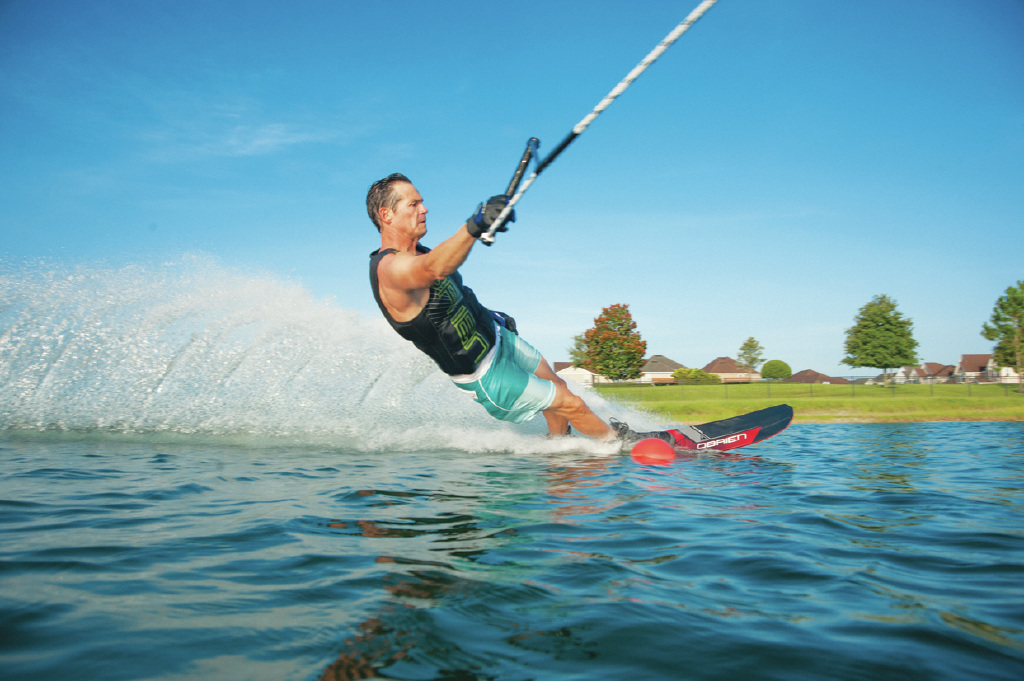
Important Water Skiing Equipment
Water skiing is an exciting water sport, but it is crucial to be well-prepared with the proper equipment to ensure a safe and enjoyable experience. The following are essential pieces of equipment that every water skier should have before hitting the waters in Florida.
One of the most critical safety items, a life jacket is mandatory for water skiers. It is imperative to wear a U.S. Coast Guard-approved personal flotation device to ensure utmost safety and buoyancy while in the water. Personal flotation devices come in various sizes and types, so it is important to select one that fits correctly and comfortably.
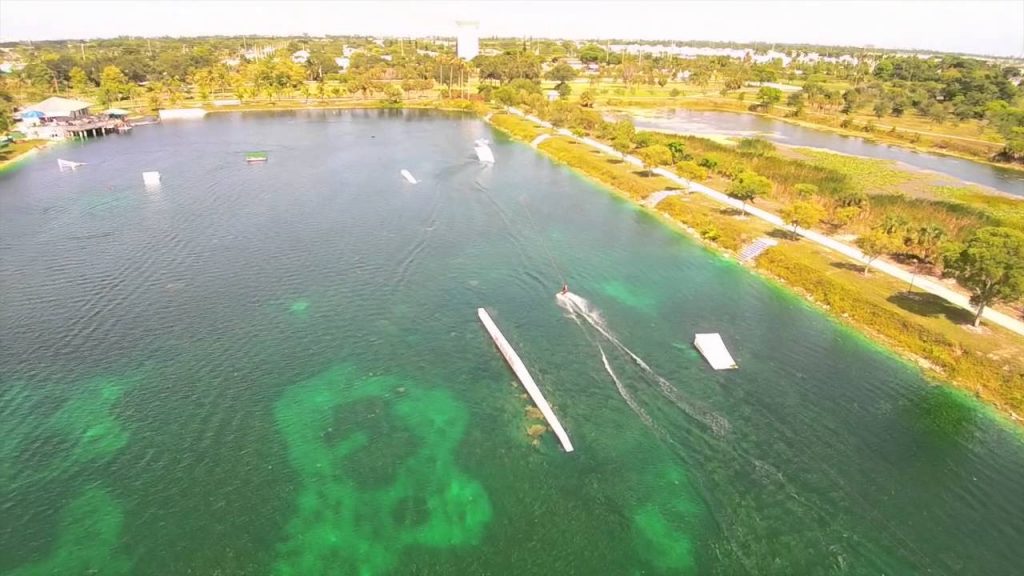
Another important piece of equipment is the tow rope, which connects the skier to the boat. A good quality tow rope, designed specifically for water skiing, should be strong and durable to withstand any tension and stress throughout the duration of the ride.
In addition to the tow rope, it is essential to have a properly maintained boat. Boats used for water skiing should be equipped with a powerful engine to pull the skier efficiently and at an appropriate speed. Additionally, the boat should have the necessary safety equipment on board, such as a fire extinguisher, whistle, and navigation lights.
For the person operating the boat, it is crucial to have a clear view of the water skier at all times. Equipping the boat with a wide-angle rear view mirror is highly beneficial to maintain a line of sight with the skier. A rear view mirror enables the boat operator to constantly monitor the skier's position and adjust the boat's speed and direction accordingly.
Jet skis or personal watercraft can also be used for pulling water skiers. However, it is necessary to make sure the jet ski is powerful enough and equipped with the appropriate tow rope for the task.
Lastly, it's good to have some basic first aid and safety equipment, such as a whistle and a waterproof flashlight, readily available in case of emergencies while on Florida waters.
By carefully considering and obtaining the vital water skiing equipment mentioned above, water skiers in Florida can ensure a safe and enjoyable experience out on the water.
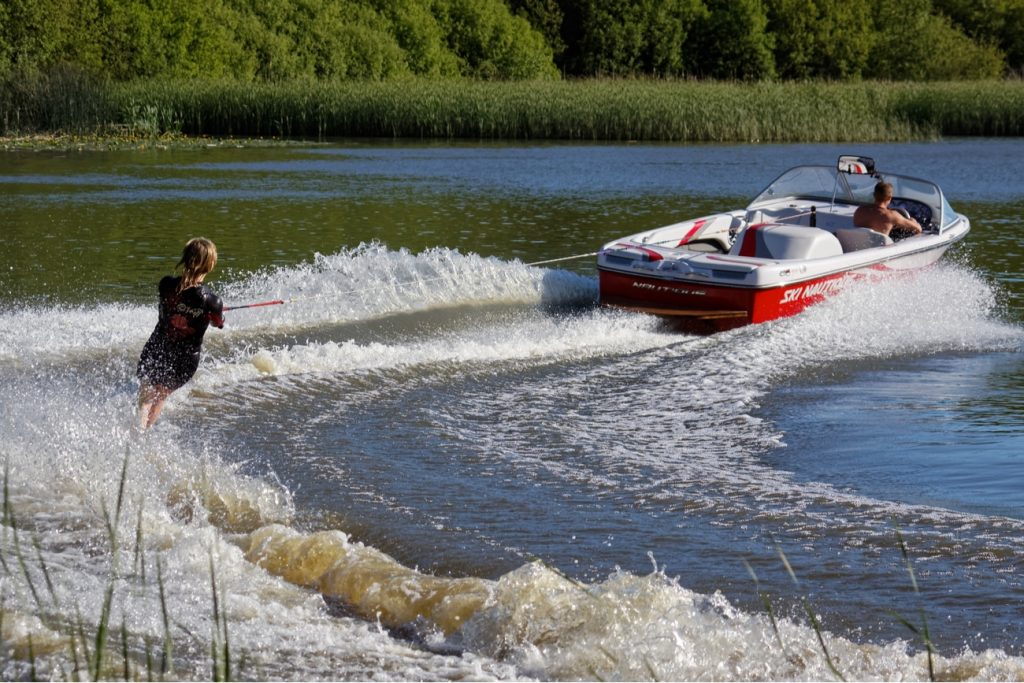
Conditions for Water Skiing
Water skiing on Florida waters is a popular recreational activity, but certain conditions must be met to ensure the safety of the skier and others on the water. In Florida, water skiing is permitted only during daylight hours, from one-half hour before sunrise to one-half hour after sunset. This limitation on time allows for optimal visibility and helps reduce the risk of accidents.
Aside from the time of day, weather conditions play a significant role in determining whether it's safe to water ski. Water skiing is not permitted when there are thunderstorms or lightning in the area, as lightning poses a significant danger to water skiers due to water's ability to conduct electricity. Additionally, water skiing should be avoided during strong winds and rough waters to maintain stability and reduce the risk of accidents.
When water skiing near beaches and rivers, it's crucial to remain aware of your surroundings and respect areas designated as no-wake zones, which are marked by buoys. No-wake zones are implemented to protect wildlife, property, and people in the water. Violating no-wake zones could lead to accidents, property damage, and penalties.
Lastly, Florida's waterskiing regulations mandate the presence of an observer or a wide-angle rearview mirror to keep a watch on the skier at all times. This ensures that the skier's actions are monitored, and necessary assistance can be provided promptly in case of any issue.
By adhering to Florida's water skiing laws and keeping safety in mind, water enthusiasts can enjoy water skiing while minimizing risks and respecting the environment.

Water Skiing Practices
Water skiing in Florida waters is a popular recreational activity enjoyed by many. To ensure safety and promote responsible skiing, certain legal guidelines and best practices must be followed by those participating.
One of the most important legal requirements for water skiing in Florida is the restriction on skiing times. According to Florida law, water skiing is only permitted during daylight hours, from one-half hour before sunrise to one-half hour after sunset. Skiing outside of these legal hours can result in fines and penalties.
Another key aspect of safe skiing is having the appropriate personnel on the vessel. The boat operator should be experienced and knowledgeable about the local waterways and conditions. In addition, an observer must be present on the vessel to monitor the water skier's progress and safety. This allows the boat operator to focus on operating the vessel, while the observer communicates with the skier and immediately informs the operator if any issues arise.
When towing a water skier, it is crucial for the boat operator to maintain a safe and appropriate speed. This may depend on the experience level of the skier, the water conditions, and the size of the vessel. Also, maintaining a sufficient distance from other vessels, fixed objects, and aquaplaning devices is essential for preventing accidents.

Water skiers must adhere to proper safety practices by wearing appropriate gear. This includes personal flotation devices (PFDs), which are mandatory for riders and towed individuals. PFDs help skiers stay afloat and can be life-saving in case of an accident or fall. Skiers should also wear a wetsuit, gloves, and a helmet for added protection.
Water skiing permits may be required in certain locations or for specific events, such as jumps or tournaments. Participants should check with local authorities beforehand to ensure they have the necessary permits to legally ski in the area.
In summary, water skiing in Florida waters can be a fun and exhilarating experience when the right measures are taken. Adhering to legal requirements, safe practices, and working with experienced boat operators and observers can ensure a safe and enjoyable day on the water.

Drugs and Alcohol Usage
Water skiing, like any other water sport, requires focus and coordination. It is essential for both the skier and the boat operator to be alert and aware of their surroundings. Consumption of alcohol or drugs can impair a person's ability to operate a boat or ski safely. In Florida, it is illegal for water skiers to engage in the activity while under the influence of alcohol or drugs.
The state enforces strict regulations to ensure the safety of everyone involved in water skiing. It is particularly crucial for the boat operator to be sober and unimpaired, as they are responsible for maintaining a safe distance from other vessels and fixed objects. Florida's waterskiing regulations specifically state that no one may ski or use another aquaplaning device while impaired by alcohol or other drugs.
Operating a boat under the influence puts everyone on the water at risk, including the water skier. Boat operators must adhere to the same blood alcohol content (BAC) limits as drivers on land. In Florida, the legal BAC limit for boat operators is 0.08%, and violating this limit can result in significant penalties.
It is essential for all parties involved in water skiing to prioritize safety and maintain a clear state of mind. Both skiers and boat operators should avoid consuming alcohol or using drugs before or during the activity. By doing so, everyone can enjoy a fun and safe experience on Florida's waters.

Courses, Locations, and Tournaments
Florida's waters offer a wide range of opportunities for water skiers to practice, compete, and enjoy their sport. The subtropical climate ensures a favorable environment for water skiing throughout most of the year. Many designated areas can be found across the coastline, lakes, and Intracoastal Waterway where water skiers can perfect their skills, including slalom skiing.
Tournaments are a popular aspect of water skiing in Florida, with numerous competitive events organized throughout the state. These tournaments typically take place in specially designed courses, where skiers can showcase their skills and techniques in a controlled environment. Participants must adhere to specific rules and use standardized hand signals to communicate with the boat driver and spotter.
In addition to tournaments, Florida also hosts several exhibition events and regattas that bring water skiing enthusiasts together for demonstrations and friendly competition. These gatherings often involve marine parades, where boats navigate in a procession beneath iconic bridges, creating a festive atmosphere for boaters and onlookers alike.

When it comes to locations, Florida boasts a vast array of suitable spots for water skiing. The well-known Lake Okeechobee is a popular destination for skiers, along with various other pristine lakes scattered across the state. Designated areas reserved for water skiing can be found within these lakes, ensuring a safe and enjoyable experience for all users. Meanwhile, along the coastline and Intracoastal Waterway, water skiers can access specific points to launch from docks and make the most of Florida's picturesque scenery.
For those who wish to learn the sport or brush up on their skills, water skiing lessons are widely available throughout Florida. Experienced instructors provide guidance on techniques, safety precautions, and the use of proper equipment, ensuring that beginners and seasoned skiers alike can confidently navigate Florida's waters.
In conclusion, Florida's diverse range of courses, locations, and tournaments, coupled with its favorable climate, make it an ideal destination for water skiers of all skill levels to enjoy and participate in this exhilarating sport.
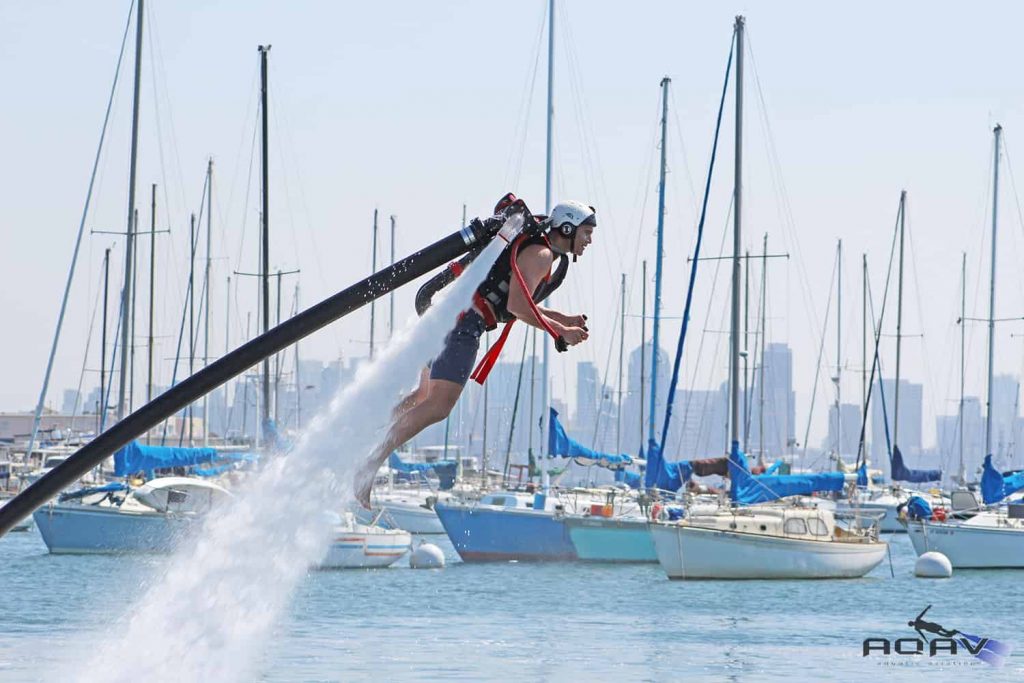
Frequently Asked Questions
What are the legal requirements for water skiing in Florida?
In Florida, legal water skiing requirements include having an observer or a wide-angle rearview mirror on the boat, in addition to the operator, to monitor the skier's progress according to Florida Statutes (327.37). Furthermore, water skiing is only allowed during daylight hours, from one-half hour before sunrise to one-half hour after sunset as per Florida law.
When is it allowed to tow a water skier in Florida?
Water skiing in Florida is permitted only during daylight hours, which is defined as one-half hour before sunrise to one-half hour after sunset. Towing a water skier outside this time frame is illegal and may result in fines according to Florida law.
What safety equipment is mandatory for water skiing?
Mandatory safety equipment for water skiing includes life jackets for both the skier and boat passengers, an observer or a wide-angle rearview mirror on the boat, and compliance with any relevant safety regulations. It is always important to ensure that the boat and its passengers adhere to all local laws and regulations.
What are the navigation rules for vessels towing water skiers?
Vessels towing water skiers must maintain a reasonable distance from divers-down flags or buoys. In open waters, this distance should be at least 300 feet, while in rivers, inlets, or navigation channels, it should be at least 100 feet. Boaters should also be cautious and respectful of other vessels, swimmers, and wildlife in the water.
Are there specific waterways in Florida where water skiing is prohibited?
There may be specific waterways in Florida where water skiing is prohibited or restricted due to safety concerns or environmental reasons. It is essential to check local regulations and signage before engaging in water skiing activities in any particular area.
What are the age restrictions for water skiing in Florida?
While there are no specific age restrictions for water skiing in Florida mentioned in the search results, all participants should follow local safety regulations and ensure they have the necessary skills and equipment for safe water skiing. Guardian supervision may be a good idea for young water skiers to ensure their safety and adherence to the law.
Footnotes
Charlie is Editor-in-Chief of Sea Magazine